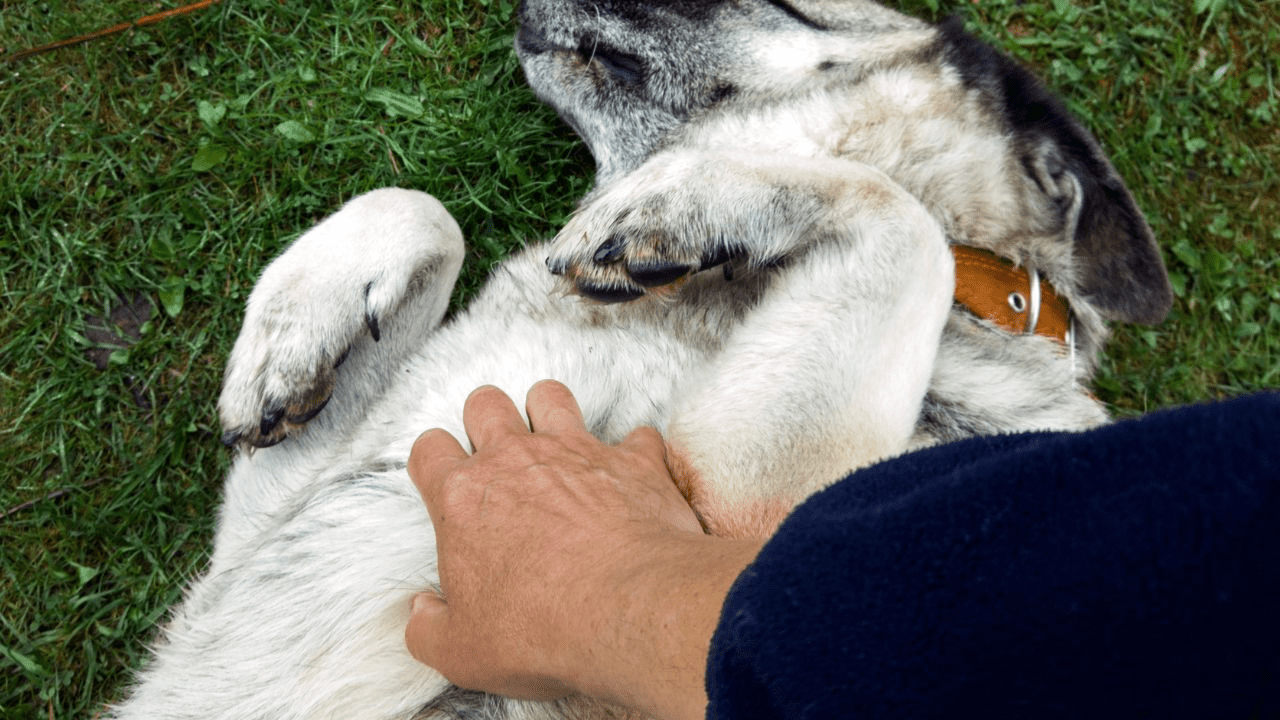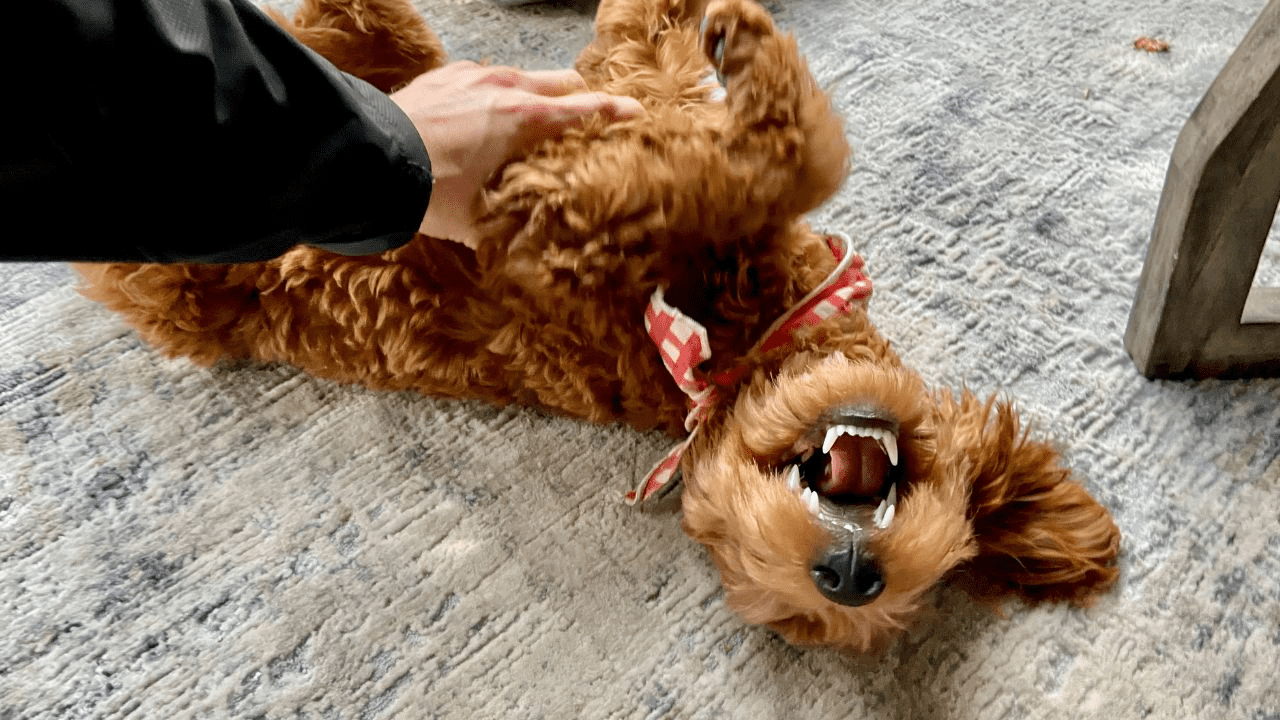Do you know what those strange noises your dog’s stomach is making are?
No, it’s not growling because it’s hungry (although that may be part of it).
In this article, we will discuss the different reasons why a dog’s stomach may be making noise.
Some of them are relatively harmless, but others can be indicative of a more serious problem.
If your dog’s stomach has been making weird noises lately, read this post to find out what could be causing it!
Dog’s Stomach Making Noises – The Reasons

Diarrhea
Dog stomach noises can be a sign of digestive upset and an upset stomach such as diarrhea.
If your pup is making stomach gurgles, grumbles and growls, they may have eaten something their stomach isn’t used to or has overindulged.
They then have an upset stomach.
It’s worth noting what your dog has eaten recently and if they act differently afterward.
Diarrhea, though unpleasant, should clear up with some rest and fluids in 24-48 hours.
If you suspect an upset tummy, it’s wise to take them to the vet for further investigation.
Otherwise, if your pup is acting normal and stomach sounds lose intensity over time, there is no need for concern.
Poor-Quality Food
Stomach noises from your pet dog can often be a sign of poor-quality food that a dog ate.
While this is not always the case, it should be carefully considered.
Gurgling noises can indicate your dog’s digestive system is unable to properly digest its food.
The stomach needs quality ingredients and balanced nutrition in order to metabolize the fuel that keeps them going throughout the day.
Food that is light on nutrients or high in fat or sugar can seriously impact the stomach’s ability to process what they eat.
This often leads to loud noises or worse health issues.
To fix this problem, try switching to a higher-quality brand of food specifically designed for dogs.
And make sure any treats your dog eats are also benefiting their diet.
Bowel Obstruction
Dogs’ stomach noises can indicate a serious stomach-related issue, particularly Bowel Obstruction and other inflammatory bowel disease.
Bowel Obstruction occurs when there is an obstruction in the stomach or intestines that prevents food and liquids from moving through the dog’s digestive tract.
This issue can result in stomach noises such as dog’s stomach gurgling.
As well as pain, bloating, vomiting, constipation, and loss of appetite.
If your dog is experiencing stomach noises, it’s important to take them to their vet to properly diagnose the condition.
It can be life-threatening if left untreated.
Gastrointestinal Disorders

Dogs’ stomach noises are usually caused by stomach upset, infection, inflammation, or dietary indiscretion.
When stomach noises interfere with a dog’s everyday life.
Preventing them from eating, drinking, and enjoying activities–it is time to see a vet and start looking for the cause behind them.
Some stomach problems can develop very quickly in dogs.
Diagnostic tests such as X-rays or bloodwork may need to be performed to determine the cause of the stomach noises and related discomfort the dog may be experiencing.
Treatment varies according to what condition is found but can range from medication to diet changes and more.
Intestinal Parasites And Bacterial Infections
Loud stomach noises coming from our canine companions can sometimes be a sign of something more serious than the occasional stomach growl after a big meal.
The stomach sounds could be caused by parasites or bacterial infections, which could require veterinary attention.
Parasites such as roundworms, whipworms, and hookworms can settle into your dog’s stomach and intestine causing loud noise and other unpleasant symptoms such as diarrhea, weight loss, and vomiting.
A bacterial infection in the stomach is another potential cause of excessive stomach noises that need to be addressed with proper medication.

If you notice abnormal stomach noises coming from your pup, it’s best to give your vet a call so they can investigate further to ensure that your four-legged friend stays healthy and happy.
Too Much Gas / Too Much Air
Dogs’ stomach noises can be caused by a number of different things, the most common being too much gas and too much air.
Gas in the stomach is produced through digestion, and when too much is present, it can cause stomach noises like rumbling and gurgling.
Too much air in the stomach can also cause stomach noise as a result of a dog gulping down its food too quickly.
If you notice your pup’s stomach making noises frequently, it might be beneficial to try and reduce their portions or slow down their eating speed, so they don’t swallow in excess air.
Additionally, changing up your dog’s diet may also help to relieve any stomach noises.
Keeping an eye on your dog’s stomach will help you to find out what’s causing their noise, and if necessary, consult a professional vet for further advice.
Hunger Pains
Most dogs have stomach muscles that bend and twist when they’re hungry.
These hunger pains often lead to stomach gurgling and growling, which can be both loud and frequent if the dog’s stomach is particularly empty.
Your pup will sometimes swallow additional air if it doesn’t receive food soon, leading to even louder stomach noises.
You should always ensure that your puppy is well-fed so those stomach noises become a distant memory.
After all, nobody wants to live with rumblings in their tummy!
Is Dogs Stomach Making Noises Normal?

Yes, it is normal for a dog to make noises with their stomach.
These digestive grumblings are usually caused by gas passing through the intestinal tract and can often be harmless.
Pay attention to your dog’s behavior and diet, as these sounds might indicate something else, like parasites or illness, if they become too frequent or loud.
You should consult your veterinarian if you have concerns about your pet’s health.
Are Your Dog’s Stomach Noises Painful?
No, most of the time, your dog’s stomach noises are not painful.
They are likely caused by gas passing through the intestines or from digestion.
However, if your dog has persistent stomach noises that sound painful, it is always best to take them to the vet for a checkup just in case there may be an underlying medical issue causing their discomfort.
Your vet can also provide advice on how to best manage the symptoms.
Additionally, keeping your pup’s diet balanced and feeding them regularly may help reduce stomach noises.
Overall, most of the time, noisy stomachs are not a cause for concern but if you have any questions or concerns about your pet’s health, always consult with a professional.
How To Reduce Your Dogs Stomach Making Noises

The best way to reduce your dog’s stomach noises is to feed them a balanced and nutritious diet.
That will help keep their digestive system and digestive tract running smoothly, which can significantly decrease the amount of abdominal gurgling.
Additionally, you should monitor the number of treats they consume and avoid table scraps to keep their stomach contents in check.
If your dog’s stomach gurgles persist, you should consult your veterinarian for further advice and medical care if necessary.
When Should You Call The Vet For Dog Stomach Noises?
If your dog is experiencing stomach noises and other bowel or digestive issues such as vomiting, diarrhea, decreased appetite, lethargy, or weight loss, you should bring your pet to the vet for an examination.
Additionally, suppose a normally active and energetic dog appears to be in pain due to stomach noises or stops regularly eating due to discomfort from the noise.
In that case, you must contact your vet immediately.
If any signs of distress are present, along with stomach noises, it is best to call and make an appointment.

Before You Go…
Now you know why dogs stomach making noises.
If you want to learn more, read the following articles too!


